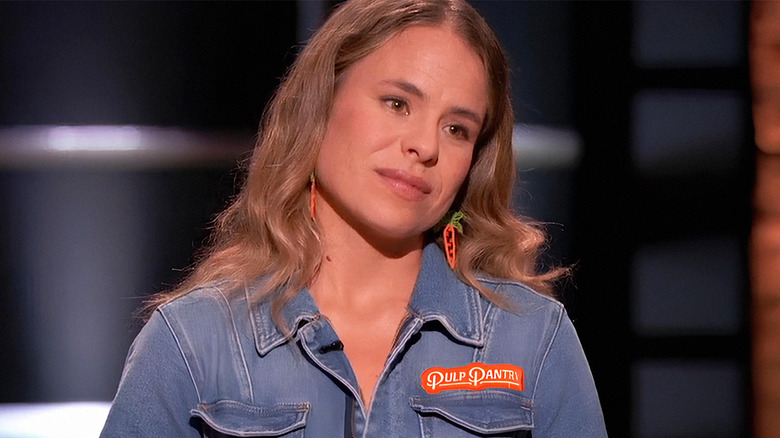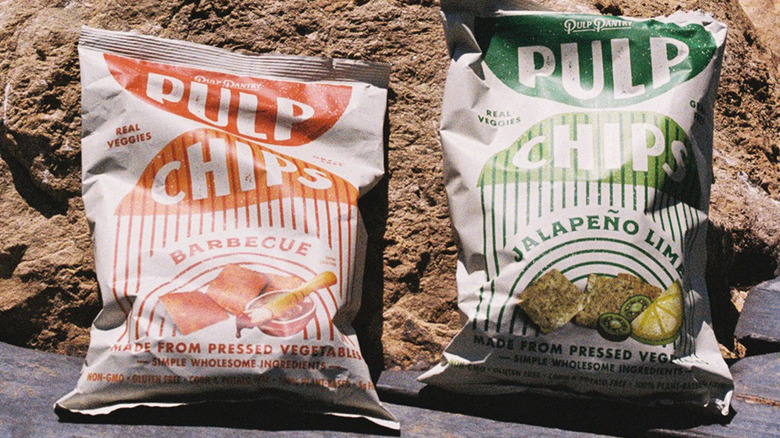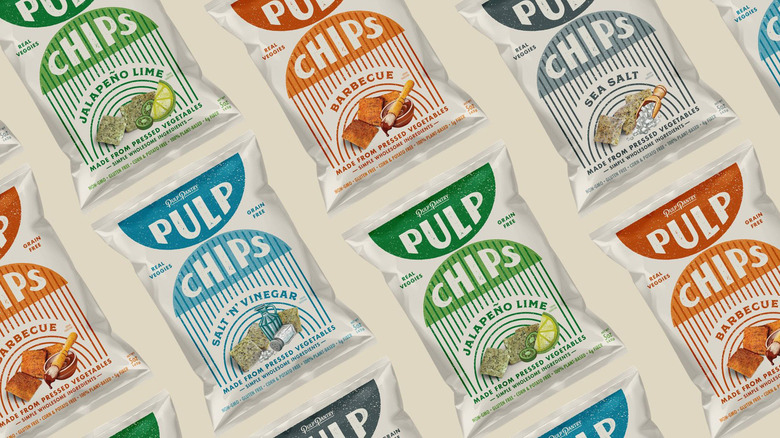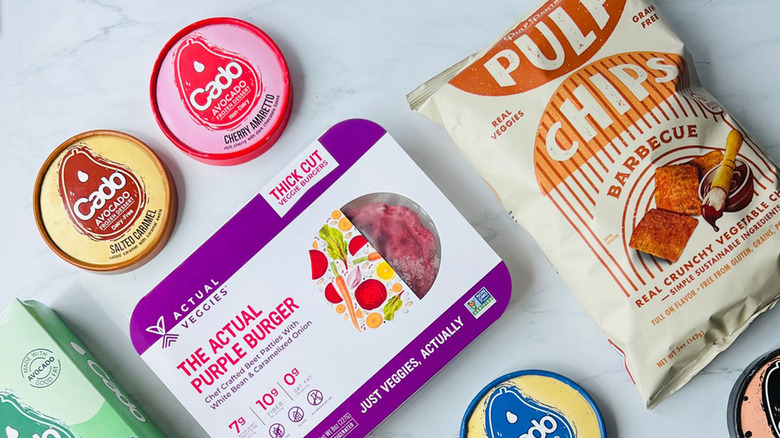Whatever Happened To Pulp Pantry Chips After Shark Tank?
Pulp Pantry competed on Season 13, Episode 22 of "Shark Tank." The company's presented product was a snack chip made of vegetable fiber waste. To make this crunchy treat, founder Kaitlin Mogentale established working relationships with some of the biggest organic juice brands — since those companies typically pay a composting company to recycle their vegetable fiber waste. Instead, Pulp Pantry paid for the labor required to remove and transport that fiber, saving those juice companies money while acquiring a key ingredient at a low cost.
Mogentale came up with the idea for Pulp Pantry in college when she was an environmental studies major. With the encouragement of her professors, she took a class project and developed it into her snack business. Pulp Pantry produces four chip flavors: sea salt, salt and vinegar, jalapeño lime, and barbecue. Since they're made primarily of vegetable byproducts and plant flours, the chips adhere to vegan, gluten-free, and grain-free diets. There are also five grams of fiber contained in a single serving.
On "Shark Tank," Kevin O'Leary and guest Shark Emma Grede were impressed by how good her chips tasted. But then it came time to talk numbers ...
What happened to Pulp Pantry on Shark Tank?
In her episode, Mogentale kicks off her "Shark Tank" presentation by asking for $500,000 in exchange for 10% of Pulp Pantry. To give the Sharks a better idea of the financial state of her company, she states that each bag of chips costs her $1.70 to produce. They then wholesale for $3.24 and cost $4.99 to $5.49 on store shelves. In 2021, the year before its episode aired, Pulp Pantry netted approximately $250,000 in sales, earning a $20,000 profit. In 2022, the company was expected to double the previous year's sales number.
After hearing these figures, Barbara Corcoran comments that the snacks industry is too competitive and bows out of negotiations. O'Leary is intrigued but doesn't agree with Mogentale's $5 million evaluation of Pulp Pantry, so he offers her desired $500,000 but for 25% of the company. Grede agrees with Kevin's assessment but rather than propose a deal she thinks might be insulting, she backs out. Lori Greiner is the first to counter O'Leary's offer, proposing a $500,000 loan at 6% interest over three years in exchange for 10% equity.
Then, Mark Cuban comes in hot: He lists off some of the environmentally friendly food businesses he's invested in — including premade oatmeal brand MUSH, which grew after "Shark Tank." He proposes $500,000 for 20%, which Mogentale negotiates down to 17% and then accepts Cuban's offer.
Pulp Pantry after Shark Tank
After shaking hands on investment terms, a deal's finer points happen once the cameras stop rolling. Sometimes this means that deals made on "Shark Tank" fall apart after episodes air. It seems like this may have been the case for Pulp Pantry, as a blog post on the company's website noted that the Sharks ultimately passed on the deal.
In an interview on the Brand Alchemist Podcast, Mogentale had great things to say about her "Shark Tank" appearance nevertheless. First, Mogentale characterizes the show and its national platform as a unique opportunity to grow awareness of a company's brand. She then outlines how her work on "Shark Tank" affected her company. "It really set me up well for what was gonna come, which was going out to raise from private investors," she said. While she didn't delve into this process any further, Pulp Pantry secured investment opportunities in the end.
Cuban is still involved with the company, albeit as a repeat customer rather than a business partner. O'Leary too buys from her regularly. "Shark Tank" served its intended purpose for Pulp Pantry, helping the company establish new business relationships even without an investment from the Sharks.
Is Pulp Pantry still in business?
Pulp Pantry is still active to this day. While the company's range of chip flavors is still the same as what Kaitlin Mogentale showcased on "Shark Tank," her appearance on the show was ultimately good for business and helped the company grow.
One major benefit of the company's "Shark Tank" episode was its ability to get the attention of some other influential brands and individuals. For example, YouTuber and food business owner Emma Chamberlain described Pulp Pantry's products at length in an episode of her podcast "Anything Goes." Pulp Pantry's jalapeño lime flavor in particular also landed a spot on a list of traditional chip alternatives published by Gwyneth Paltrow's Goop brand.
So, even if Pulp Pantry hasn't expanded its product offerings and remains largely the same company today as it was on "Shark Tank," the brand is still growing in notoriety on the strength of those very products that Mogentale pitched to the Sharks.
What's next for Pulp Pantry?
One way Pulp Pantry is currently in the process of expanding its size and influence is through business partnerships. Pulp Pantry chips are available at Maison Jar, a store in New York City that sells food products in reusable glass containers to cut down on food waste. The Pulp Pantry website also invites social media influencers to apply to be brand ambassadors, suggesting that cross-promotion is currently one of the company's priorities.
Another key initiative for Pulp Pantry is its ongoing commitment to environmental advocacy. On TikTok, the company shares videos highlighting the environmental impact of food waste in addition to traditional promotional posts. The Pulp Pantry website also regularly spotlights brands with which the company doesn't necessarily have a working relationship but wants to showcase their shared commitment to environmentalism. Around the end of 2023, the company even won a competition that Google hosted in which brands showcased ways to store snack products in bulk in a manner that eliminated single-use plastics.
Pulp Pantry's priorities don't seem to include new products or flavors for the time being. Rather, by establishing new partnerships and remaining committed to environmental initiatives, Pulp Pantry remains focused on sustainably expanding within its particular niche.



